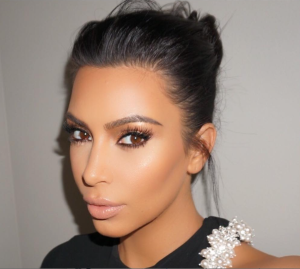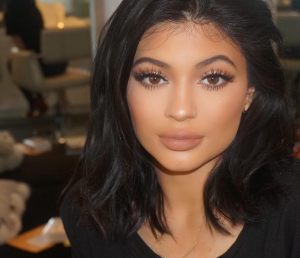The other day, while scrolling through Instagram, I came across a photo of Kim Kardashian.
Beautiful, right? That’s pretty undeniable. However, if you ask me, it seems a bit unrealistic. There’s not ONE flaw to be found in this picture. The easiest thing to believe is that Kim Kardashian is an anomaly and that she’s the ONE person on earth that is literally perfect. I was starting to believe that until I scrolled down a little further and came across a selfie of Kylie Jenner (Yes, I follow the entire clan #NoJudging).
Her picture is JUST as flawless as Kim Kardashian’s picture! At this point, I became a little dubious and I began wondering what the heck was going on. Is it something in their blood? Is this a level of beauty that I and anyone else can reach? I had so many questions!
This morning, as I was scrolling down Instagram (Yes. I spend an inordinate amount of time on the ‘gram. Again #NoJudging), I came across a photo of my friend. Her picture looked similar to the photos of Kim and Kylie that I saw earlier in the week. Flawless. That’s when I knew that this was more than genetics and that there was something being used to edit these images. After a quick search on Google (my trusty friend), I found the answer.
Apparently, there’s an app (it shall remain nameless) that allows users to edit EVERYTHING about their photo. Want rounder eyes? You got it! Lighter complexion? No problem! Change of eye color? Done! I must admit that I played around in the app for a bit and started editing EVERY photo in my phone. I was addicted. Once I pried my phone out of my hand and stepped away from the app, I started thinking about what this all meant about current beauty standards and the role that social media plays in setting them.
Think about the number of impressionable young girls who follow the Kardashians, the Jenner sisters and the countless other “Instagram celebs” that flood our timelines with unrealistic images. These young girls see these “perfect” images and they begin to develop an idea of beauty that is completely unrealistic. They say things like, “Why can’t I look like that?” or “I wish I was that pretty.” Little do they know that those photos have been altered and changed before being made public. To some, this is a nonissue. However, I see this becoming a major problem as social media platforms become more and more popular. If these types of images continue to be put out (with no disclaimer), you have to wonder about how they are impacting the young, impressionable youth. If something doesn’t change, we’ll begin to see a rise in plastic surgery operations and a drastic decline in self-esteem.
I don’t know if there’s a fix to this problem, however, I think that campaigns like Dove’s Real Beauty and Always’ #LikeAGirl can help to counteract the negative affect that these unrealistic images have on the minds of young and old people around the world.



8 Responses to What a Kim Kardashian Selfie Teaches Us About Social Media and Beauty Standards